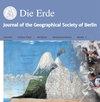Engaging in the ‘multi-territorial site of the political’: Political practices of Latin American landless movements in the struggle for food sovereignty
IF 0.6
4区 地球科学
Q3 GEOGRAPHY
引用次数: 1
Abstract
In both the global north and south the claim for food sovereignty (FS) has become a powerful antithesis to the globalized economy of food. Drawing on scientific debates around the spatial and political dimensions of FS, we will focus in this contribution on how this emerging claim materializes in practice and space. Therefore, we will analyze in an exemplary manner political practices of the Brazilian and Bolivian Landless Movements, which adopted the idea of FS as a guideline for their political action. Our results reveal that these groups do not only fight for FS in the form of ‘typical’ representational and overt political actions such as land occupations, the blocking of roads and manifestations. Rather, we will show that the Landless Movements also express their claims quite subtly, in surprising but yet very powerful ways through multifarious, spatially effective and meaningfully interconnected social practices, which reveal their political character only upon second glance. In order to conceptualize our observations and to recognize the political momentum of these practices, we draw on insights from social theory and political theory and identify three constitutive principles that enable us to make political practices in their ‘worldliness’ distinguishable and recognizable. Building on this conceptualization, we will further propose the approach of the ‘multi-territorial site of the political’ as an analytical tool to investigate the complex geographies of social movements, in particular but not exclusively, in the context of FS in Latin America.参与“政治的多领土场所”:拉丁美洲无地运动在争取粮食主权斗争中的政治实践
在全球北方和南方,对粮食主权(FS)的要求已经成为粮食全球化经济的有力对立面。借鉴围绕FS的空间和政治维度的科学辩论,我们将重点关注这一新兴主张如何在实践和空间中实现。因此,我们将以一种模范的方式分析巴西和玻利维亚无地运动的政治实践,这些运动采用FS的思想作为其政治行动的指导方针。我们的研究结果表明,这些团体不仅以“典型的”代表性和公开的政治行动(如土地占领、道路封锁和示威)的形式为FS而战。相反,我们将展示无地运动也非常微妙地表达他们的主张,以令人惊讶但却非常强大的方式,通过各种各样的、空间上有效的、有意义的相互联系的社会实践,这些社会实践只有在第二次看时才能揭示他们的政治特征。为了将我们的观察概念化,并认识到这些实践的政治动力,我们借鉴了社会理论和政治理论的见解,并确定了三个构成原则,使我们能够使政治实践的“世俗性”得以区分和识别。在这一概念的基础上,我们将进一步提出“政治的多地域场所”的方法,作为一种分析工具来调查社会运动的复杂地理,特别是但不限于拉丁美洲的FS背景。
本文章由计算机程序翻译,如有差异,请以英文原文为准。
求助全文
约1分钟内获得全文
求助全文
来源期刊

Erde
GEOGRAPHY, PHYSICAL-GEOSCIENCES, MULTIDISCIPLINARY
CiteScore
2.90
自引率
6.20%
发文量
0
审稿时长
>12 weeks
期刊介绍:
DIE ERDE is a publication of the Geographical Society of Berlin
DIE ERDE is a scientific journal in Geography, with four issues per year with about 100 pages each. It covers all aspects of geographical research, focusing on both earth system studies and regional contributions.
DIE ERDE invites contributions from any subfield of both Physical and Human Geography as well as from neighbouring disciplines.
 求助内容:
求助内容: 应助结果提醒方式:
应助结果提醒方式:


